In the autumn-winter period, along with the cool weather, health problems with the respiratory tract begin. Of course, in pharmacies there are countless of pills, powders, syrups and all kinds of drugs, even without a prescription.
But in most cases they are quite expensive and sometimes ineffective. In fact, you can try to prepare healthy and tasty home remedies for cold and cough with very simple and affordable means.
One of the proven natural remedies for this purpose is the quince fruit. It is rich in tannins, sugars, essential oil, organic acids (citric, quinic, malic, etc.), pectin, rutin, iron, vitamin C, potassium, sodium, calcium, phosphorus, some antioxidants, etc.
Quince seeds are an essential ingredient in cough and cold decoctions. They contain mucous substances, tannins, nitriles, glycosides, fats, amino acids, organic acids, phenols. The essential oils contained in the skin of the fruit have a beneficial antimicrobial effect, preventing the spread of infection.
The chemical composition of the fruit and quince seeds determines its healing properties: general strengthening, antioxidant, anti-inflammatory, expectorant, antibacterial, antiviral, antifungal and even antidepressant.
The proven scientific composition and properties confirm the folk experience in the use of quince in the treatment of problems with the respiratory tract.
What healing decoctions can we prepare from the valuable fruit? Here are some suggestions.
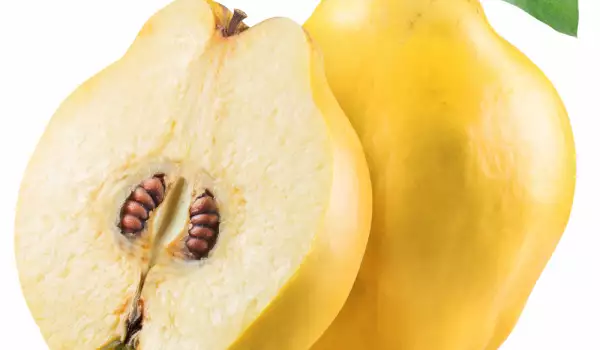
Decoction from quince peels and cores
Ingredients:
peel and cores (with the seeds) from 1 kg of quinces
water - 1.5 liters
sugar - 7 tablespoons (or by taste)
the juice of half a lemon
Preparation:
Pour the peels and cores into the water (preferably in an enamel pot), if you wish, you can add quince slices, so that the decoction will be more aromatic, but all the value and benefit is in the peel and core. It is especially good if the seeds in the core are surrounded by wax, the more the better. Boil over high heat. Then reduce the heat, cover with a lid and boil for 45 minutes. Strain and add the sugar and lemon juice. Drink it as tea, which is preferably warmer.
You can diversify the quince decoction by adding apples, using whole quince fruit, replacing sugar with nebet sheker or honey. If you add honey, it is important to do so after the decoction has cooled, so that it retains its valuable properties. You can also add some herbs, like a few leaves of geranium or 1-2 tablespoons of basil or thyme. The amount of decoction is sufficient for one day's intake, divided into equal intervals during the day. You can also prepare the decoction in a smaller amount for a single intake, by following the proportions.

Quince fruit decoction for sore throat and cough
Ingredients:
quince - 1 pc.
water - 250 ml
Preparation:
Boil the water and add the quince (without the core), cut into small pieces. Boil for 5 minutes. Remove it from the heat and infuse it covered for about half an hour. Drink the strained decoction in 3 equal parts during the day. For children, you can give 1 tablespoon several times a day.
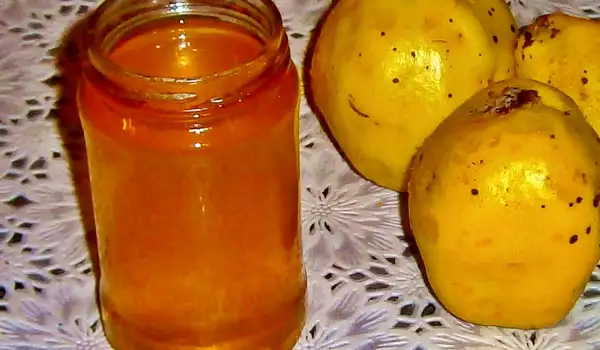
Cough syrup with quinces and walnuts
Ingredients:
quinces - 2 pcs.
walnuts - 3 pcs. (whole)
water - 1.5 liters
sugar or honey (optional)
Preparation:
The quinces are washed well and cut into pieces, by leaving the skin and core. The walnuts are washed and crushed - they're used with the shells. Put them together with the water on the stove and after it reaches a boiling point, boil for 15 minutes. After it cools down, strain it. You can sweeten it however you like. The amount is drunk for the day in equal parts and time intervals.
Quince seed tea for sore throat and cough
Ingredients:
water - 300 ml
quince seeds - 1 tsp.
Preparation:
Boil the water and pour the seeds. Infuse them covered for 1 hour and strain. A mucous like liquid is obtained. Drink 1 cup, 3 times a day before meals. The mixture from the seeds envelops and soothes an irritated throat and promotes expectoration.
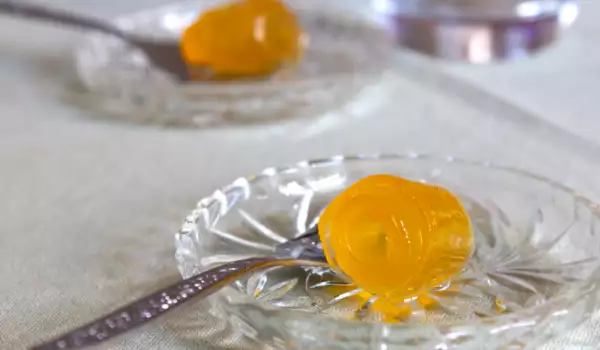
Quince jelly for cough and sore throat
Ingredients:
quinces - 2-3 pcs.
water - 250 milliliters
honey - 1 tbsp. (or sugar)
Preparation:
For the medicine we will need the cores with the seeds of 2 large or 3 small quinces. Boil the water and add the chopped cores. Boil, until it thickens like jelly. If using honey, add it after the jelly has cooled. Sugar is added while it's hot. It is especially suitable for children - give them 1 tablespoon during a coughing fit.
Traditional expectorant syrup
Ingredients:
quinces - 1-2 pcs.
mint cough drops - 6 pcs.
Turkish delight - 6 pcs. (ordinary)
geranium - 6 fresh leaves
walnuts - 2-3 pcs. (whole)
onion - 1 onion (with the skin)
water - 1 liter
Preparation:
Wash the quinces well. You will need the peels and the core - cut into pieces. Cut the Turkish delight. Wash the onion and cut it into 4 pieces without removing the skin. Wash and lightly crush the walnuts and you will also need the shells. Put all of the ingredients in a pot on the stove and after the boiling point is reached, boil for 15 minutes on high heat. Then boil over low heat, until the Turkish delight and cough drops melt. After cooling it is filtered. Drink half a glass 3-4 times a day. For small children, 1-2 tablespoons can be given.
The recipe has many variations: it can be prepared without cough drops, add an apple or use nebet sheker, sugar or honey instead of Turkish delight. Some also add expectorant herbs, while others do not sweeten the decoction.
General recommendations
Do not forget before preparing the healing decocton to thoroughly wash the quinces from the moss on the peel. Do not use darkened and rotten fruit.
Do not swallow, chew or break the integrity of the quince seed coating! The nut contains hydrogen cyanide, which in small quantities is not harmful, but in large quantities it becomes poisonous.
If you use honey, pay attention to existing allergies and never add honey in hot liquids - only warm!
If you use herbs, pay attention to their effect, whether they have side effects and whether you are not allergic to them.
You should be especially careful if you prepare decoctions and home remedies for small children. It is recommended that you share your intentions with your pediatrician and ask for his opinion. Start with a very small dose and observe the child's reactions - general condition, allergy, etc. After making sure that there are no side effects, proceed with the treatment.
In any case, remember that self-medication can be dangerous. In case of severe and prolonged conditions, consult a doctor!
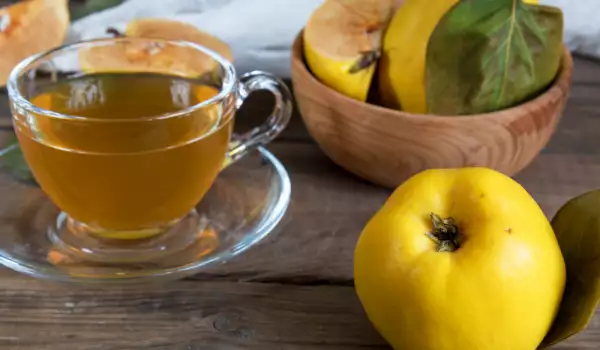







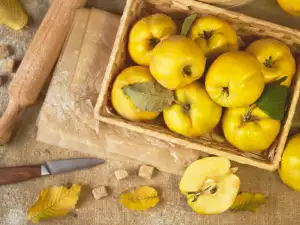

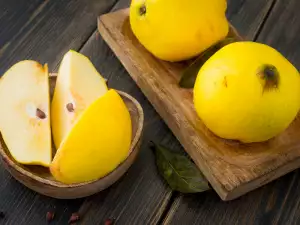
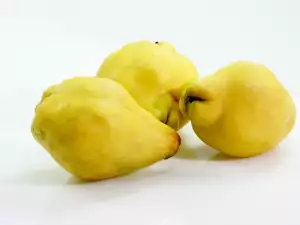
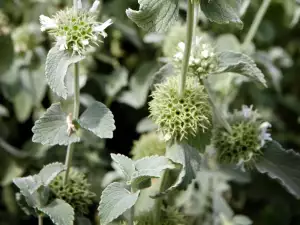
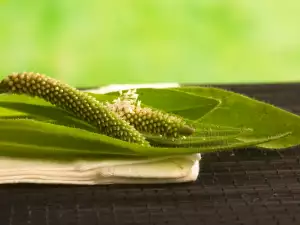
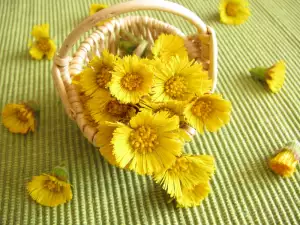




Comments